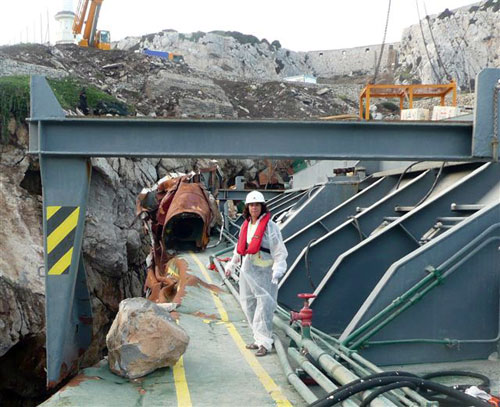After close to 2 weeks since a major storm hit Gibraltar resulting in infrastructural damage and a vessel writing itself off against our cliffs, the ESG wishes to raise several important points for wider consideration. Firstly, and obviously, once again, congratulations have to be given to everyone who carried out their duties in such unbelievable conditions. One thing is to respond to an emergency in a calm environment, but as everyone knows the conditions up Europa Point and indeed in other worst affected areas like the Port and promenade by Westview Park were dangerous and frankly, hitherto unknown.
As we weigh up the longer term impacts from the weekend, the ESG wishes to advise that it has been busy and pleased to have been directly engaged by Port officials in the aftermath of the disaster (see photographs). The ESG can also advise that the handling of the oil contamination and the salvage operation are, in its view, in the best possible hands. Many questions remain however, over the engineering troubles of el Fedra and whether there are any other vessels moored long-term off the eastside in a similar state?
Background:
The group had coincidentally met with the Minister of the Port, the new Captain, Environmental Agency and Port officials, a mere three days before Fedra and the storm hit Gibraltar. On the agenda were the main areas the group has been campaigning on for some years now, including:
• Fumes from bunkering and available technology- better information for community
• Eastside Vessels (unregulated and uncontrolled)
• Heightened risk of accidents at sea, cross port coordination (New Flame most significant at that time)
• Implementation of previous accident report recommendations produced by the Maritime Administration
The ESG left that meeting with expectations that Govt was now preparing to tackle all of the above issues; it was hoped, as a matter of priority, with the impetus of a newly appointed and experienced Captain of the Port, Peter Hall, raising expectations of achieving desired results.
The ink had not dried on a letter to the Minister of the Port thanking him for the frank and positive meeting when the storm and FEDRA happened.
THE FUTURE
Clearly many elements at play but the overriding issue for the ESG is that while we do not have adequate shipping controls in the Bay, be it in Gibraltar, or at cross border level, FEDRA is yet another example of the reality of the risks we face from the current situation.
The ESG urges Government to make public its intentions to address this situation and give a timeline on when significant improvements like a VTS system and eastside regulations among others, will be in place. Cross border port controls are clearly well overdue and must be prioritised at all political mtgs with the Spanish and British governments, and at the forthcoming Tripartite talks. A major collision or sinking of a fully laden fuel tanker with several thousand tonnes of crude oil, or any other hazardous cargo, has to be avoided. Effects on resident’s health and quality of life, tourism, fishing, restaurants, leisure craft and recreational areas would be devastating and recovery of the area would take years.
We can all down play the recent accident and be relieved that the Bay has been spared once again. However, even a moderate maritime accident has implications both for the environment and for the community.
South district residents were already breathing fumes off the moderately small spill from El Fedra, fumes which quickly vaporise in the heat and are very unpleasant and potentially harmful to inhale over a long period of time. Our drinking water supplies were affected by this oil spill; many of our recreational areas are sealed off for an indeterminate time. While no major fauna and flora may have been affected, dead birds have been seen and we know where there’s one, there could be more. Shorelines have been stained and marine life will have been affected, while difficult to quantify. Another important point to mention is that oil spill recovery in these past few weeks has been hampered by one glaring fact- the amount of rubbish/flotsam in the sea- something the ESG has been focusing on for some years under the CUTW banner. While storms produce a lot more flotsam the operators were informed by the ESG of the year round problems affecting the Mediterranean Sea from land borne and marine based waste material.
If we begin to consider the full impacts of a major oil spill surely this should drive the matter to the very top of any political and government agenda.





